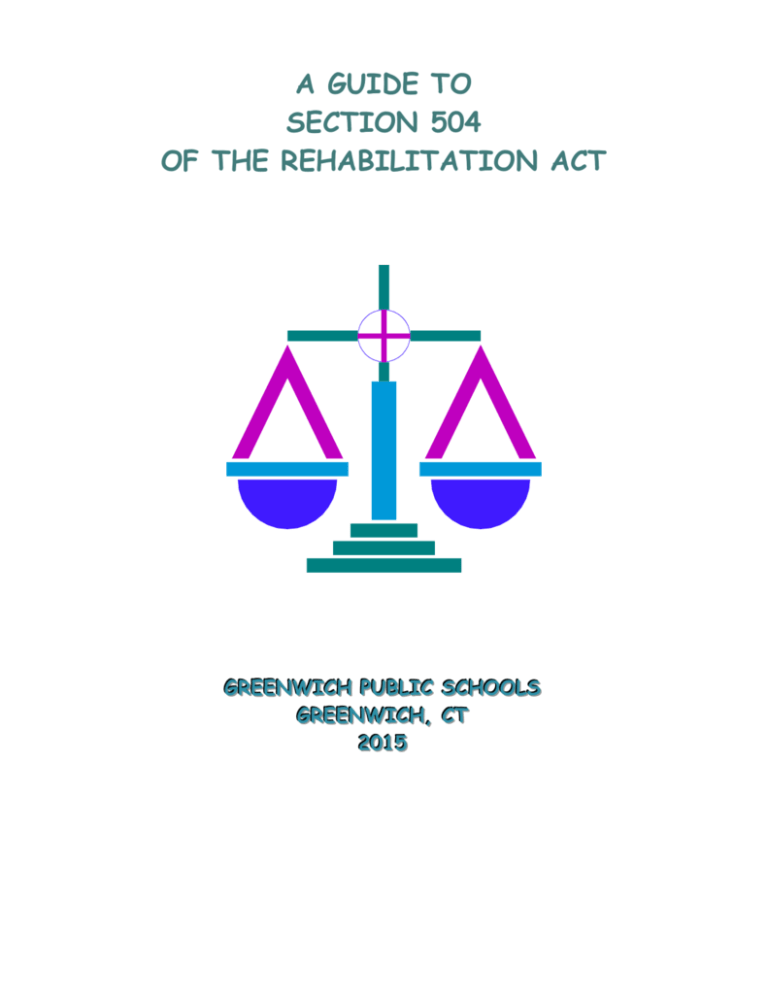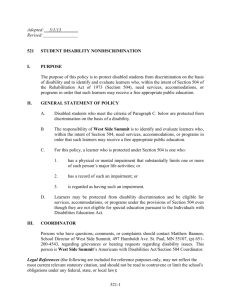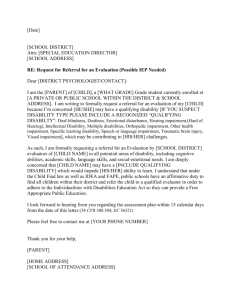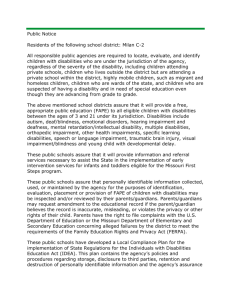Section 504 Guide - Greenwich Public Schools
advertisement

A GUIDE TO SECTION 504 OF THE REHABILITATION ACT G GR RE EE EN NW WIICCH H PPU UB BLLIICC S SCCH HO OO OLLS S G GR RE EE EN NW WIICCH H,, CCT T 22001155 Introduction Section 504 of the Rehabilitation Act of 1973, amended in 2008, is a federal civil rights law designed to eliminate discrimination on the basis of disability. Specifically, Section 504 states that: No otherwise qualified individual with a disability shall, solely because of his or her disability, be excluded from the participation in, be denied the benefits of, or be subjected to discrimination under any program or activity receiving federal financial assistance. The U.S. Department of Education, Office of Civil Rights (OCR), enforces Section 504. Section 504 outlines a process for schools to use in determining whether a student has a disability and in determining what services a student with a disability needs. This evaluation process must be tailored individually because each student is different and his or her needs will vary. Our goal is to make our school programs and activities equally accessible for eligible students with disabilities. Upon referral from a parent, counselor, teacher or other staff member, students will be evaluated, and if eligible, a plan of accommodations will be created to describe the adjustments and/or services necessary to ensure students with disabilities have an equivalent opportunity to benefit from our schools’ instructional and extracurricular programs. Like Section 504, the Americans with Disabilities Act (ADA) is civil rights legislation for individuals with disabilities. The ADA’s Title II deals with state and local governmental entities, including schools. Entities covered must make the reasonable accommodations necessary to ensure persons with disabilities have access to the goods and services they provide. The Individuals with Disabilities Education Act (IDEA) covers only students with specific disabilities who require special education services to benefit from an education. Disability areas are not specified under Section 504, and a student with disabilities is protected even if he or she does not need special education services and requires only accommodations and/or services. Under Section 504, students with disabilities must be given an equal opportunity to participate in academic, nonacademic, and extracurricular activities. The regulations also require school districts to identify all students with disabilities and to provide them with a free appropriate public education (FAPE). Under Section 504, FAPE is the provision of regular or special education and related aids and services designed to meet the individual educational needs of students with disabilities as adequately as the needs of students who do not have disabilities are met. The Greenwich Public School shall offer a free appropriate public education (FAPE) to each qualified student with a disability. Services provided to qualified students are not required to produce identical results or level of achievement with nondisabled peers. Services must be designed to offer an equal opportunity to gain the same benefit within the most integrated setting appropriate. Identification, Evaluation and Referral Procedures Any student with a disability who needs or is believed to need accommodations, modifications, or services not available through existing programs in order to receive a free appropriate public education may be referred by a parent, teacher or other certified school employee to their school’s pupil review team for identification and evaluation of the student’s educational needs. A multi-disciplinary 504 Team will be composed of persons knowledgeable about: the student and his or her functioning, the meaning of evaluation data, the suspected impairment, and the accommodation/placement options. The parent/guardian and the student will be invited to participate in all 504 team meetings and be provided with a copy of their rights under Section 504. The 504 team will consider the referral, review the student’s existing academic, social, behavioral and health records, and determine if there is sufficient information to make the determination of the presence of a physical or mental impairment that substantially limits a major life activity. If additional information is needed to make this determination, the 504 Team will gather additional evaluation data and reconvene when the information is obtained. Section 504 states that no otherwise qualified student who demonstrates a physical or mental impairment that substantially limits one or more major life activities shall be excluded from participation in, be denied the benefit of, or be subject to discrimination in any program or activity offered by the Greenwich Public Schools. In order for a person to be covered, the individual must be otherwise qualified to do something (have the essential requirements needed) before the presence of a disability can be a factor in discrimination. The phrase “qualified person with a disability” means any person meeting one of these criteria: 1. has a physical* or mental** impairment that substantially limits one or more major life activities, 2. has a record of such type of impairment, or 3. is regarded as having such impairment. * any physiological disorder or condition, cosmetic disfigurement or anatomical loss affecting one or more of the body systems: communicable diseases, chronic asthma, severe allergies, eating disorders, diabetes (does not exclude other impairments) ** any mental or psychological disorder such as intellectual disability, organic brain syndrome, emotional or mental illness, specific learning disability, attention disorders, mood disorders, ADHD, behavior disorders, depression, anxiety (does not exclude other impairments) Criteria 2 and 3 do not generate a school district’s obligation to provide a FAPE, and consequently schools have no duty to identify, assess or place students who qualify only under these criteria. These criteria protect students from discrimination (different treatment than students without disabilities). They are meant to reach the situation in which a student either does not currently have or never had a disability but is treated by others as such. If a student’s learning or behavioral problems are attributable to cultural, environmental, or economic disadvantage rather than a mental or physical impairment, the student is not eligible. Section 504 specifically excludes substance abuse disorders resulting from the illegal use of drugs, sick building syndrome, voyeurism, gender identity issues not resulting from physical impairment, or other sexual disorders/differences. A student with an educational deficit caused by economic, cultural or environmental disadvantages should not be considered to have an impairment under Section 504, nor should a student with educational deficits due to limited English proficiency. The expanded definition of disability states that “major life activities” include, but are not limited to, caring for oneself, performing manual tasks, seeing, hearing, eating, sleeping, walking, standing, lifting, bending, speaking, breathing, learning, reading, concentrating, thinking, communicating, working. The term includes basic activities that the average person in the general population can perform with little or no difficulty, and includes basic activities necessary to access learning or other aspects of the school district’s programs. Major bodily functions include the operation of an individual organ as well as body systems such as immune, digestive, circulatory, respiratory, musculoskeletal, etc. Episodic conditions (depression, Crohn’s disease) or those in remission (cancer), can be considered disabilities if, when symptoms flare up, they substantially limit a major life activity of the student. Temporary, non-chronic impairments of short duration, with little or no long-term or permanent impact usually are not disabilities (includes broken limbs, concussions). An impairment that is, or is expected to be, BOTH transitory AND minor is not covered. Transitory is defined as lasting or expected to last six months or less. Certain conditions may be treated by medication, behavior techniques or learned strategies, with prosthetic devices, or assistive devices. In these cases, determination of substantial limitation shall be without regard to the effects of mitigating measures. Ordinary eyeglasses or contact lenses are excluded. Section 504 regulations do not define the term “substantial limitation”. OCR ruled that school districts generally have considerable discretion in defining this term. The ADA makes it clear that the definition of “substantial limitation” and “disability” shall be construed in favor of broad coverage. An impairment does not need to significantly/severely restrict or prevent a major life activity to be considered substantially limiting. The 504 team needs to look for substantial impact/restriction on the student’s ability to perform a major life activity as compared to most people in the general population, e.g., compared to the average student of his/her age and grade level. School personnel and other members of the 504 Team must use their collective, professional judgment to make this determination. In determining whether an individual is substantially limited in a major life activity in the context of the ADA, it may be useful to consider, as compared to most people in the general population, the condition under which the individual performs the major life activity, the manner in which the individual performs the major life activity, and/or the duration of time it takes the individual to perform the major life activity. Accommodation Plan If the student is found to have a disability as defined by Section 504, the 504 Team will likely develop a written 504 Accommodation Plan describing the disability and the reasonable accommodations, modifications and/or services needed to provide the student with an educational opportunity equal to that provided to non-disabled students. The 504 Plan will specify how the accommodations, modifications and services are to be provided and by whom. The team may also determine that no accommodations, modifications or services are appropriate. The 504 Plan and/or continued eligibility will be reviewed periodically to determine whether they are appropriate and necessary. The typical best practice is once a year. The student’s 504 Plan will be distributed to the school personnel who work with the student. At the middle school and high school level in the Greenwich Public Schools, the School Counselor is typically responsible for initiating the evaluation, leading the process of determining eligibility, developing appropriate accommodations, and monitoring the implementation of 504 Plans for students in grades 6 through twelve. Other staff members who may be responsible are school administrators, school nurses, school social workers, and school psychologists. At the elementary level, the Assistant Principal or School Psychologist is typically the staff member who has this responsibility. Procedural Safeguards NOTICE OF PARENT/STUDENT RIGHTS UNDER SECTION 504 OF THE REHABILITATION ACT OF 1973 The Greenwich Public Schools will not discriminate on the basis of a disability as required under the ADA (Americans with Disabilities Act), the IDEA (Individuals with Disabilities Educational Act, Section 504 and Connecticut General Statutes 10-76a and any other similar law or provision. Mary P. Forde, Director of Pupil Personnel Services (203-625-7466) has been designated to coordinate compliance with the ADA. Section 504 of the Rehabilitation Act of 1973 (commonly referred to as “Section 504”) is a nondiscrimination statute enacted by the United States Congress. The purpose of Section 504 is to prohibit discrimination and to assure that disabled students have educational opportunities and benefits equal to those provided to nondisabled students. An eligible student under Section 504 is a student who (a) has, (b) has a record of having or (c) is regarded as having, a physical or mental impairment which substantially limits a major life activity such as caring for oneself, performing manual tasks, seeing, hearing, eating, sleeping, walking, standing, lifting, bending, speaking, breathing, learning, reading, concentrating, thinking, communicating and working. A major life activity may also include the operation of a major bodily function, such as an individual’s immune, digestive, respiratory, or circulatory systems. Many students will be eligible for educational services under both Section 504 and the Individuals with Disabilities Education Act (IDEA), but entitlement to services under the IDEA or other statutes is not required to receive services under Section 504. The following is a description of the rights and options granted by federal law to students with disabilities under Section 504. The intent of the law is to keep you fully informed concerning decisions about your child and to inform you of your rights if you disagree with any of these decisions. You have the right: 1. To be informed of your rights under Section 504; 2. To have your child take part in and receive benefits from the Greenwich School District’s education programs without discrimination based on his/her disability. 3. For your child to have equal opportunities to participate in academic, nonacademic and extracurricular activities in your school without discrimination based on his/her disability; 4. To be notified with respect to the Section 504 identification, evaluation, and educational placement of your child; 5. To have an evaluation, educational recommendation, and placement decision developed by a team of persons who are knowledgeable of your child, the assessment data, and any placement options; 6. If your child is eligible for services under Section 504, for your child to receive a free appropriate public education. This includes the right to receive reasonable accommodations, modifications, and related services to allow your child an equal opportunity to participate in school and school-related activities; 7. For your child to be educated with peers who do not have disabilities to the maximum extent appropriate; 8. To have your child educated in facilities and receive services comparable to those provided to non-disabled students; 9. To review all relevant records relating to decisions regarding your child’s Section 504 identification, evaluation, and educational placement; 10. To obtain copies of your child’s educational records at a reasonable cost unless the fee would effectively deny you access to the records; 11. To request changes in the educational program of your child; 12. To an impartial hearing if you disagree with the school district’s decisions regarding your child’s Section 504 identification, evaluation or educational placement. The costs for this hearing are borne by the local school district. You and the student have the right to take part in the hearing and to have an attorney represent you at your expense. 13. To file a court action if you are dissatisfied with the impartial hearing officer’s decision or to request attorney’s fees related to securing your child’s rights under Section 504. 14. To file a local grievance with the designated Section 504 Coordinator to resolve complaints of discrimination other than those involving the identification, evaluation or placement of your child. 15. To file a formal complaint with the U.S. Department of Education, Office for Civil Rights. The Section 504 Coordinator for this district is: Judith Nedell, Coordinator of Guidance Services, Greenwich High School, Telephone: 203-625-8000 For additional assistance regarding your rights under Section 504, you may contact: Boston Regional Office, Office for Civil Rights, U.S. Department of Education, 33 Arch Street, Suite 900, Boston, MA 02110-1491, Telephone: (617) 289-0111 U.S. Department of Education, Office for Civil Rights, 550 12th Street, SW, Washington, DC 20202-1100, Telephone: (800) 421-3481 Connecticut State Department of Education, Bureau of Special Education and Pupil Services, P.O. Box 2219, Hartford, CT 06145, Telephone: (860) 807-2030 SECTION 504 GRIEVANCE PROCEDURE It is the policy of the Greenwich Public Schools not to discriminate on the basis of disability. The Greenwich Public Schools has adopted an internal grievance procedure providing for prompt and equitable resolution of complaints alleging any action prohibited by Section 504 of the Rehabilitation Act of 1973 (29 U.S.C. 794) of the U.S. Department of Health and Human Services regulations implementing the Act. Section 504 prohibits discrimination on the basis of disability in any program or activity receiving Federal financial assistance. The Law and Regulations may be examined in the office of Judith Nedell, Coordinator of Guidance, (203) 626-8097, who has been designated to coordinate the efforts of the Greenwich Public Schools to comply with Section 504. Any person who believes she or he has been subjected to discrimination on the basis of disability may file a grievance under this procedure. It is against the law for the Greenwich Public Schools to retaliate against anyone who files a grievance or cooperates in the investigation of a grievance. Procedure: Grievances must be submitted to the Section 504 Coordinator within 30 days of the date the person filing the grievance becomes aware of the alleged discriminatory action. A complaint must be in writing, containing the name and address of the person filing it. The complaint must state the problem or action alleged to be discriminatory and the remedy or relief sought. The Section 504 Coordinator (or her/his designee) shall conduct an investigation of the complaint. This investigation may be informal, but it must be thorough, affording all interested persons an opportunity to submit evidence relevant to the complaint. The Section 504 Coordinator will maintain the files and records of the Greenwich Public Schools relating to such grievances. The Section 504 Coordinator will issue a written decision on the grievance no later than 30 days after its filing. The person filing the grievance may appeal the decision of the Section 504 Coordinator by writing to the Director of Pupil Personnel Services/Special Education, Mary Forde, (203) 625-7466 within 15 days of receiving the Section 504 Coordinator’s decision. The Director of Pupil Personnel Services/Special Education shall issue a written decision in response to the appeal no later than 30 days after its filing. The availability and use of this grievance procedure does not prevent a person from filing a complaint of discrimination on the basis of disability with the U. S. Department of Health and Human Services, Office for Civil Rights. The Greenwich Public Schools will make appropriate arrangements to ensure that disabled persons are provided other accommodations, if needed, to participate in this grievance process. Such arrangements may include, but are not limited to, providing interpreters for the deaf, providing taped cassettes of material for the blind, or assuring a barrier-free location for the proceedings. The Section 504 Coordinator will be responsible for such arrangements. All Forms related to Section 504 are available on the Greenwich Public Schools website, or in hard copy from school personnel.








